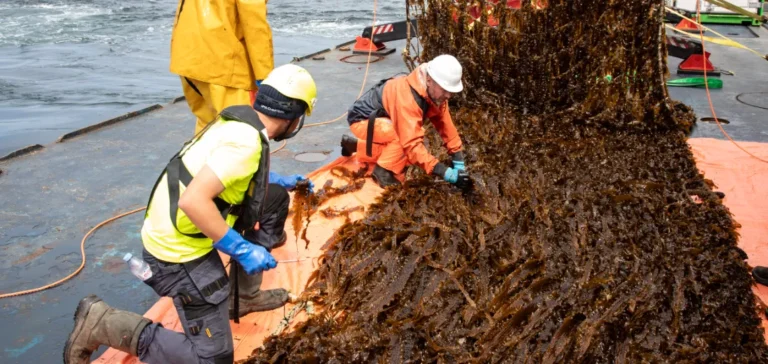North Sea Farmers has completed the first commercial harvest of marine seaweed within an offshore wind infrastructure, covering five hectares in the “Hollandse Kust Zuid” wind farm off the coast of Scheveningen. The operation is part of a project funded to the amount of EUR2mn ($2.17mn) by the Amazon Right Now climate fund, bringing together industrial and scientific partners for an unprecedented trial in the North Sea.
Integrating a seaweed farm with wind infrastructure
Installing the farm between the wind turbines secures an area protected from maritime traffic for seaweed cultivation. The harvesting process uses specialised vessels navigating between turbines, collecting seaweed with nets anchored to the seabed. Eva Faict, Amazon’s Country Manager for the Netherlands and Belgium, stated that this operation demonstrates the commercial viability of seaweed cultivation in this offshore industrial context.
Research teams are using this initial harvest to study the integration of large-scale seaweed cultivation in maritime spaces already occupied by energy infrastructure. Eef Brouwers, Managing Director of North Sea Farmers, pointed out that this experience validates the possibility of operating commercial seaweed farms within existing offshore installations.
Scientific monitoring and data collection
The farm is being monitored by Plymouth Marine Laboratory, Deltares and Silvestrum Climate Associates, through satellite analyses and on-site visits. Professor Ana M Queirós, Head of Climate Change at Plymouth Marine Laboratory, stated that the project will enable analysis of carbon transfer between seawater, seaweed and the local ecosystem, as well as potential impacts on biodiversity.
The anticipated results of these studies are intended to clarify the technical and scientific conditions for the development of other offshore seaweed farms. The project partners emphasise the need for objective data to consider expanding the model to other wind farms, in line with regulatory frameworks and technological advances.
The completion of this harvest marks a step in the industrialisation of seaweed cultivation in the North Sea. The findings gathered will serve as a reference for potential pilot projects at other European maritime sites.






















